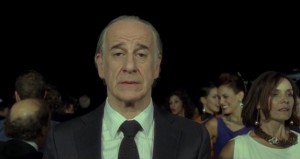The Great Beauty: an Oscar to our existential distress
 It is all settled beneath the chatter and the noise. The silence and the feeling. The excitement and fear. The sparse, erratic flashes of beauty. And then the wretched squalor and the miserable man. All buried by the blanket of the embarrassment of being in the world.
It is all settled beneath the chatter and the noise. The silence and the feeling. The excitement and fear. The sparse, erratic flashes of beauty. And then the wretched squalor and the miserable man. All buried by the blanket of the embarrassment of being in the world.
Finally, the movie of Paolo Sorrentino made the grade: it won the Oscar for the best foreign film.
Beyond the sterile criticism received in the ‘homeland’ and the fact that we can recognize or not the legitimacy of a similar event, there is no doubt that The Great Beauty, presented in May, 2013, has managed to discuss a lot as movie of social and existential criticism.
It is not just a matter of having revealed with powerful images – with a real punch in the stomach – the decadence of the Roman or Italian salons frequenters, or even to have shown the emptiness of the lives of those who, bored with their own life, seek refuge in pitiful, festive rituals.
The movie breaks the silence on our social relations: in fact, even in different places from those shown through the protagonist Jep Gambardella (Toni Servillo), a rich, nihilistic writer resigned to the times, the substance is the same. This widespread unease penetrates our lives, ‘the embarrassment of being in the world’, the ‘chatter and the noise’, the ‘wretched squalor’, are all elements of our lives, even if at different levels and different ways.
Feelings, in and out of certain rituals more or less attributable to the concept of ‘high life, experienced by every human being: like the one in the movie, that can be defined bourgeoisie (while not showing current figures as the industrialist, the banker or the politician).
“The most important thing I discovered after turning 65 is that I can’t waste time doing things I don’t want to do.”
“The dancing trains at our parties are the best cause they go nowhere.”
“Look at these people, this wildlife. It’s my life, and it’s nothing.”
The silence on our social relationships turns out: how we spend our time, for what purpose – that we call “fun”- and then the spaces in which we are looking for it (our parties, our places, our holidays where maybe we listen to the same group dances of the film); the alienation (self-portraits on Facebook for ourselves and our “friends”); the regular use of substances, the particular role of the family.
All in a cage of suffering and pain that lies in the background and then suddenly reappears, with the illusion that there are some “vibrations” that measure what we experience; while, however, we can not explain what is happening.
Jep Gambardella, while doing consciously part of that snobbish world surrounded by the greatest beauties of the worldwide space / time – ideologies crystallized by art -, wonders about the sense of beauty and life, despite spending his existence in a house beside the Colosseum, among beautiful women and continuous amusement (all elements caught abroad as a symbol of Italian lifestyle). He does it as protagonist, in a continuous alternation of depression and confusion, euphoria and apparent happiness, rationality and irrationality. It’s the pursuit of an impossible balance, even if as privileged in this society. The same balance that, in the social scale, we all try to find, even in the most unfavorable conditions. What Servillo share with every human being is therefore the frustration in not knowing how to relate to a society that, while still having something to offer (art, those social ties not yet completely dissolved, food and sex) is directed towards the barbarism, both individual and collective.
“We are all on the verge of despair, the only thing we can do is look yourself in the eye, keep your company, joke a little…or not?”
Not surprisingly, in December, we chose to show this film: to discuss about the need for a collective escape from this situation, because alone you never get anywhere. Even if we can rely on years of history and experience, presented in a powerful way in the images: Rome with its two millennia of history, the Catholic Church and then, more recently, the references to the various ‘Italian anomalies’; the party (PCI), the the long ’68, the feminist movement. Even if in the so-called Bel Paese, with a mild climate and good food, there is no way out: suffering for everybody, exactly as elsewhere.
What prevails is ruling class’ opportunism, moralism, commodification and all its unnecessary social conventions, all shown with different examples in the film.
A passage of the film makes the idea: in the dead of night, a man, while speaking of the daughter who works in a night club, told the protagonist: ‘she always need money, I don’t know for what. If it were for drugs … so maybe we would have a passion in common. Do I look like a poor man Jep? When I speak, I listen to me: oh, I’ve got almost 70 years and i’m forced to do six in the morning every day. 15 years ago I gave up cocaine and I started with heroin, think wthat asshole. Becoming a heroin addict at 50 years old, but can you be poorer than me? ‘
It is easy to adapt to this, and at the same time it is impossible. The Great Beauty perfectly captures the pursuit of salvation that every character of the film embodies, as a metaphor for our condition of freedom deprivation and of constant material and immaterial needs.
The plastic surgeon beatified by customers as the savior, the relationship with death intertwined with our lives when we least expect it, leaving us disoriented because we presume to understand how society works when we do not understand the laws of nature; the research, even spiritual, of a guide, a reference point (which is absent in the film, of course, even with Cardinal Bellucci, who prefers to discuss recipes and devote himself to parties).
All this, for us who write, should be the subject of a deep reflection for those who have a grain of sensitivity, but, at the same time, do not make ourselves delude that overcoming the existing social relations may in itself solve anything: even if cultural mainstream and power launch messages of a certain type, such as that of the movie and like many others, we have to exploit them politically. But, as highlighted by The Great Beauty, two thousand years of power, history, and space management can not be overcome easily and subjectively. So, we can be satisfied with some sparse, erratic flashes of beauty in this life, at this price, or (element obviously absent in the movie) do our conscious part, on history and its trends. Being convinced that, to move from the realm of necessity to that of freedom, there will need several generations.
Read also:






















